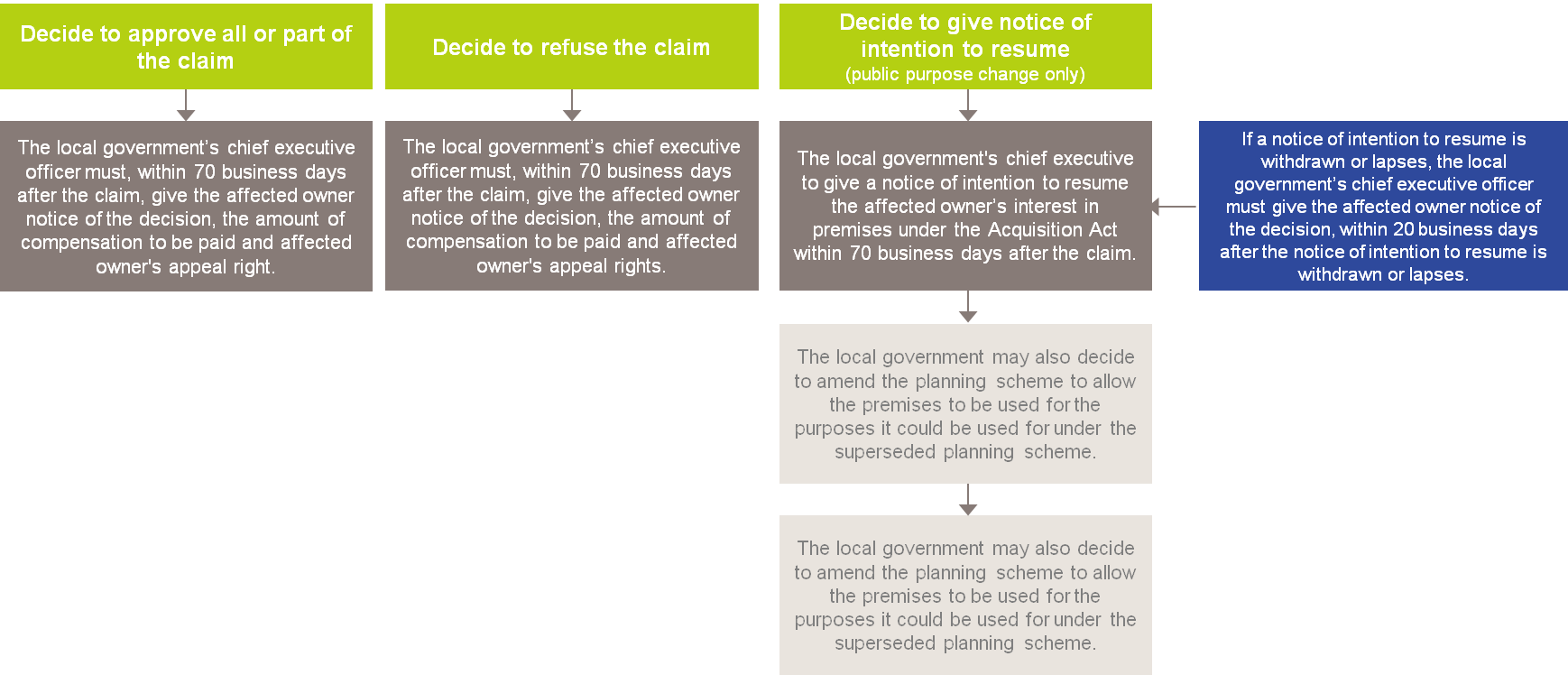When and how you can claim compensation will depend upon the type of adverse planning change.
This article is the fourth in our series examining the key provisions of the new Planning Act which is expected to commence on 3 July 2017.
Compensation arrangements, in relation to planning changes that reduce the value of interest in land, carry forward from the Sustainable Planning Act 2009 (Qld) (SPA) and are now referred to as "adverse planning changes". New arrangements are in place for planning changes made as a result of natural hazards.
Adverse planning change
A person with an interest in premises at the time an adverse planning change starts to have effect for the premises (an affected owner), may claim compensation under the Planning Act because of the adverse planning change. An adverse planning change is a planning change that reduces the value of an interest in premises (which does not include the making or amending of a Temporary Local Planning Instrument (TLPI)1
- includes a planning change (a public purpose change) that limits the use of premises to either the purpose for which the premises were lawfully being used when the change was made or a public purpose; and
- does not include a planning change that:
-
- has the same effect as another statutory instrument, other than a TLPI, for which compensation is not payable; or
- is made to comply with the regulated requirements (ie. where the regulation prescribes requirements for the contents of a local planning instrument); or
- includes infrastructure in a planning scheme, or removes or changes the infrastructure shown in a planning scheme, including under a designation; or
- is about matters included in a Local Government Infrastructure Plan; or
- is made to reduce a material risk of serious harm to persons or property on the premises from natural events or processes (eg. bush fires, coastal erosion, flooding or landslides) as required under the Minister's Guidelines and Rules2; or
- is about the relationships between, the location of, or the physical characteristics of, buildings, works or lots, if the yield achievable is not substantially different from the yield achievable before the change. The yield achievable is not substantially different from the yield achievable before the change, in relation to building work for a residential building, if the gross floor area of the residential building:
-
- is not more than 2,000m2; and
- is reduced by not more than 15%.
A claim for compensation may be made to the local government by the affected owner as follows:
Adverse planning change: An adverse planning change that is a public purpose change.
Timing for claim: 2 years after the adverse planning change has effect.
Adverse planning change: A person may, within 1 year after the planning scheme and related policies become a superseded planning scheme, make a superseded planning scheme request in relation to the superseded planning scheme.
Development that becomes assessable development after the adverse planning change has effect, if:
- the local government refuses a superseded planning scheme request in relation to the development; and
- a development application has been made for the development; and
the development application is refused, approved with development conditions, or approved in part, with or without development conditions.
Timing for claim: 6 months after the notice of decision is given to the affected owner.
Adverse planning change: A person may, within 1 year after the planning scheme and related policies become a superseded planning scheme, make a superseded planning scheme request in relation to the superseded planning scheme.
Development that becomes prohibited development after the adverse planning change has effect, if the local government refuses a superseded planning scheme request in relation to the development.
Timing for claim: 6 months after the notice of decision is given to the affected owner.
However, an affected owner may not claim compensation because of an adverse planning change to the extent that compensation is payable under another Act or has been paid to a previous owner of the interest or for anything done in contravention of the Planning Act.
Deciding a claim
When deciding a compensation claim, a local government must either:

Payment of compensation
If the local government approves all or part of the claim, the local government must pay the compensation within 30 business days after:
- if the decision is not appealed - the appeal period ends; or
- if the decision is appealed - the appeal ends.
The amount of compensation payable to the affected owner is the difference between the market value of the owner's interest in premises immediately before, and immediately after, the adverse planning change.
When deciding the market value immediately after the adverse planning change the local government must consider:
- any benefit to the owner's interest in the premises, or in neighbouring premises, because of the adverse planning change (for example, the likelihood of improved amenity in the locality of the premises); and
- any benefit to the owner's interest in neighbouring premises because, after the adverse planning change but before the compensation claim was made:
-
- another planning change started to have effect; or
- infrastructure, other than infrastructure that the owner funds, was constructed or improved on the neighbouring premises; and
- any conditions or other limitations that might reasonably have applied to development of the premises under the superseded planning scheme; and
- for an adverse planning change that was the subject of a superseded planning scheme request:
-
- the effect of any other planning change that started to have effect after the adverse planning change but before the superseded planning scheme request was made; and
- the effect of any development approval.
However, the local government must not consider:
- the effect of any TLPI. It is anticipated that where any amendment is made to a planning scheme to reflect a TLPI, the compensation arrangements for planning scheme amendments will apply and compensation may be possible at this stage; or
- the land being joined with, or separated from, other land.
RELATED KNOWLEDGE
- Getting to know the Queensland Planning Act 2016: Development assessment
- Getting to know the new Queensland Planning Act 2016: Planning instruments and Minister's powers
- Getting to know the new Queensland Planning Act 2016 – an introduction
Footnotes
1 It is envisaged that any scheme amendment subsequently made to reflect the effect of a TLPI would be subject to the superseded planning scheme arrangements, and possibly compensation.
2 The draft Interim Minister's Guidelines and Rules dated 12 July 2016 have been released and will progress through public consultation before being finalised to support the Planning Act when it commences. The Government is yet to release the timing of the consultation period.
Clayton Utz communications are intended to provide commentary and general information. They should not be relied upon as legal advice. Formal legal advice should be sought in particular transactions or on matters of interest arising from this bulletin. Persons listed may not be admitted in all states and territories.


